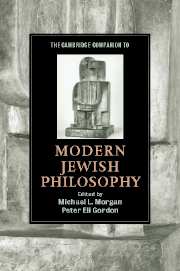Book contents
- Frontmatter
- 1 Introduction: Modern Jewish Philosophy, Modern Philosophy, and Modern Judaism
- 2 Baruch Spinoza and the Naturalization of Judaism
- 3 The Liberalism of Moses Mendelssohn
- 4 Jewish Philosophy after Kant The Legacy of Salomon Maimon
- 5 Hermann Cohen: Judaism and Critical Idealism
- 6 Self, Other, Text, God: The Dialogical Thought of Martin Buber
- 7 Franz Rosenzweig and the Philosophy of Jewish Existence
- 8 Leo Strauss and Modern Jewish Thought
- 9 Messianism and Modern Jewish Philosophy
- 10 Ethics, Authority, and Autonomy
- 11 Joseph Soloveitchik and Halakhic Man
- 12 Emmanuel Levinas: Judaism and the Primacy of the Ethical
- 13 Emil Fackenheim, the Holocaust, and Philosophy
- 14 Evil, Suffering, and the Holocaust
- 15 Revelation, Language, and Commentary: From Buber to Derrida
- 16 Feminism and Modern Jewish Philosophy
- Bibliography
- Index
1 - Introduction: Modern Jewish Philosophy, Modern Philosophy, and Modern Judaism
Published online by Cambridge University Press: 28 September 2007
- Frontmatter
- 1 Introduction: Modern Jewish Philosophy, Modern Philosophy, and Modern Judaism
- 2 Baruch Spinoza and the Naturalization of Judaism
- 3 The Liberalism of Moses Mendelssohn
- 4 Jewish Philosophy after Kant The Legacy of Salomon Maimon
- 5 Hermann Cohen: Judaism and Critical Idealism
- 6 Self, Other, Text, God: The Dialogical Thought of Martin Buber
- 7 Franz Rosenzweig and the Philosophy of Jewish Existence
- 8 Leo Strauss and Modern Jewish Thought
- 9 Messianism and Modern Jewish Philosophy
- 10 Ethics, Authority, and Autonomy
- 11 Joseph Soloveitchik and Halakhic Man
- 12 Emmanuel Levinas: Judaism and the Primacy of the Ethical
- 13 Emil Fackenheim, the Holocaust, and Philosophy
- 14 Evil, Suffering, and the Holocaust
- 15 Revelation, Language, and Commentary: From Buber to Derrida
- 16 Feminism and Modern Jewish Philosophy
- Bibliography
- Index
Summary
What is modern Jewish philosophy, and is there such a thing at all? If there is, what makes it modern? What makes it Jewish? And what makes it philosophy? Indeed, who asks such a question and for what reason? Do such questions convey a challenge to the very existence of a species of philosophy that is genuinely Jewish and modern as well? Do they call upon one to respond, perhaps in order to be an advocate on behalf of modern Jewish philosophy and to defend it against its detractors? These questions are puzzling. While they may seem simple in content and easily dispatched, even a moment’s scrutiny will expose how difficult they are to answer, and even to understand.
A skeptic might argue that there is no such thing as Jewish philosophy. For philosophy (our bold interlocutor might explain) is the pursuit of universal questions. And the methods we use when posing such questions can display no particular identities and can be bound by no particular commitments other than the devotion to philosophy itself. Julius Guttmann, one of the twentieth century’s greatest scholars on this debate, accordingly entitled his 1933 survey The Philosophy of Judaism (Die Philosophie des Judentums). The title seems to have implied that notwithstanding the particular object in view, the method remained nonetheless universal and purely rational: a philosophy of Judaism, but not a Jewish philosophy. So our imaginary skeptic may well have a point. If philosophy is simply a human impulse, then “Jewish philosophy” would have to be understood as the application of a general philosophical approach to specific themes (Judaism, Jewish existence, and so forth). But matters are hardly that straightforward.
- Type
- Chapter
- Information
- The Cambridge Companion to Modern Jewish Philosophy , pp. 1 - 13Publisher: Cambridge University PressPrint publication year: 2007
- 1
- Cited by

